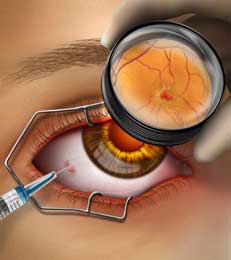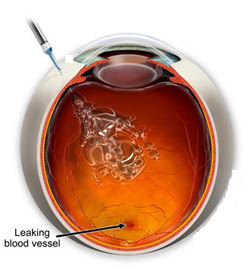Intraocular injections are used to deliver a high dose of medicine into the eye to treat retinal diseases. They may be given to dry up new vessels so that they do not bleed. They may be given to decrease swelling of the macula. Hence they are commonly given for diabetic retinopathy, age related macular degeneration, retinal vein occlusions, macular edema, uveitis, retinitis.


Which injections are given?
The commonly given injections are Bevacizumab (Avastin), Ranibizumab (Lucentis), Pegaptanib sodium (Macugen) and Triamcinolone (Tricort/Kenacort), Ganciclovir, Cidofovir.
Injections Anti VEGF Agents (Lucentis / Avastin /Macugen)
There has been a lot of excitement in management of retinal diseases, ever since the newer anti-VEGF injections have become available. These agents are being used for many eye diseases, especially for wet form of AMD (Age related Macular Degeneration), CNVM (Choroidal Neo Vascular Membrane), Severe Diabetic Retinopathy, Macular Edema (swelling), Vascular Blocks, Neovascular Glaucoma (NVG), Vitreous Hemorrhage, etc. These retinal diseases, which were earlier considered incurable, or had very poor results with existing treatments are now being tackled with good results with these anti-VEGF agents.
VEGF is a short form for Vascular Endothelial Growth Factor, which is responsible for growth of blood vessels. Besides having a role in normal vascular growth, VEGF is also responsible for many retinal diseases by causing new vessels growth and by increasing leakage and thus causing retinal swelling.
The anti-VEGF agents block the VEGF molecules and thus benefit the patients by decreasing the abnormal and harmful new blood vessels formation and by decreasing the leakage and swelling of the retina. This leads to stabilization of vision and even improvement in vision in many cases.
What is the procedure?
The injections are given in the operation theatre after preparing the eye like for other eye surgeries. It is best to have the blood sugars and blood pressure well controlled before the injection. Blood thinning medication does not need to be stopped. The pupils are dilated and numbing drops are put. The injection is given using the operating microscope. A very fine needle is used and hence there is little discomfort. The entire procedure takes a few minutes. The eye is patched for a few hours and if triamcinolone has been injected it is advised to remain seated for 4 hours after the injection and not to lie flat.
Do injections need to be repeated?
The effect of the commonly injected medications lasts for 1-3 months. If the disease needs further management then the medication needs to be injected again. It is common for these injections to be given several times.
Steroids Implants
OZURDEX® is an FDA-approved drug treatment to reduce macular edema following branch or central retinal vein occlusion.
OZURDEX® (dexamethasone intravitreal implant) is an implant injected into the eye (vitreous) and used:
![]() To treat adults with macular edema following branch retinal vein occlusion (BRVO) or central retinal vein occlusion (CRVO)
To treat adults with macular edema following branch retinal vein occlusion (BRVO) or central retinal vein occlusion (CRVO)
![]() To treat adults with noninfectious uveitis affecting the posterior segment of the eye
To treat adults with noninfectious uveitis affecting the posterior segment of the eye
![]()
